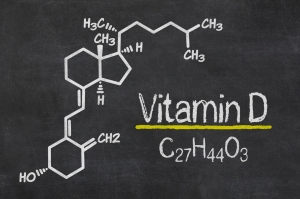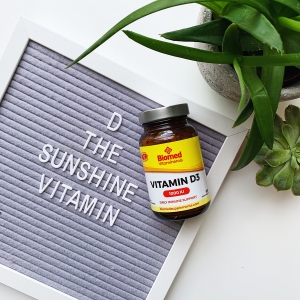Vitamin D is completely different than most other vitamins. In fact, it’s a steroid hormone produced from cholesterol when our skin is exposed to the sun. For this reason, vitamin D is often referred to as “the sunshine vitamin.”

However, during the winter months in the UK there is very little sun and certainly not enough for us to get enough vitamin D. This makes it necessary to obtain vitamin D from our diet or supplements. Only a handful of foods contain vitamin D in meaningful amounts, and deficiency is common.
Vitamin D is fat-soluble. This means it dissolves in fats and oils and can be stored in our body for a long time.
There are 2 main dietary forms:
- Vitamin D3 (cholecalciferol) – found in some animal foods, like oily fish and egg yolks.
- Vitamin D2 (ergocalciferol) – found in some plants, mushrooms, and yeasts.
Of the two forms, D3 (cholecalciferol) seems to be almost twice as effective at increasing blood levels of vitamin D as D2 (ergocalciferol), so those on a vegan diet may be at greater risk of deficiency.
Why do we need vitamin D?

Vitamin D has many functions in our bodies, but the main ones are:
- It works with calcium and other nutrients to help keep our bones strong.
- It helps support our immune system which helps us to fight colds, flu and viruses.
- It helps to reduce inflammation.
- It may also impact our gut health by altering our microbiome and the integrity of our intestinal lining.
According to the National Diet and Nutrition Survey (NDNS), in the UK, approximately 20% of people have low vitamin D levels.
What happens when we don’t have enough vitamin D?
Symptoms of vitamin D deficiency include frequent colds and infections, fatigue and tiredness, bone pain, poor wound healing, hair loss, muscle pain, and it may even impact our mood.
We’ve all heard of SAD – a type of depression that comes and goes in a seasonal pattern. Well, Vitamin D and serotonin are linked – some research suggests the symptoms of SAD may be, in part, due to changing levels of vitamin D, when we are exposed to less sun as the seasons change, which may affect serotonin levels in the brain making us sad!
 What can we do to prevent vitamin D deficiency?
What can we do to prevent vitamin D deficiency?
Public Health England recommend that adults and children over the age of one should have 10 micrograms (mcg) of vitamin D everyday and they recommend that some people may want to consider taking a supplement, particularly during the winter months from October to April, to prevent deficiency.
If you suspect you might be deficient, you may need more than this to help correct it but it is really important to test. This can be done easily with your GP and is a simple blood test or there are also finger prick tests you can do easily at home from NHS labs. By testing we can gauge if there is a deficiency, and if so, the severity of the deficiency, so we can supplement accordingly to correct it.
NB: unless specifically advised to by a health care professional, do not take more than 100 micrograms (4,000 IU) of vitamin D a day as it could be harmful. Children aged 1 to 10 years should not have more than 50 micrograms (2,000 IU) a day.
About Clemmie
Clemmie Oliver is a Registered Nutritional Therapist (mBANT) based in London. Clemmie is the founder of the Nutrition and Lifestyle Medicine (NALM) Clinic. She works with people, nationally and internationally, to improve their quality of life with Inflammatory Bowel Disease (Crohn’s Disease and Ulcerative Colitis) and Irritable Bowel Syndrome (IBS).
About Clemmie Oliver



Leave a Comment: